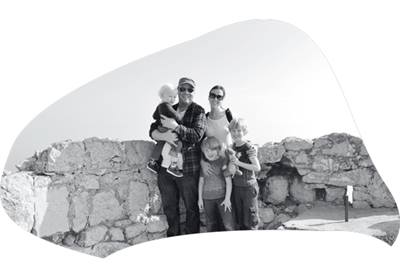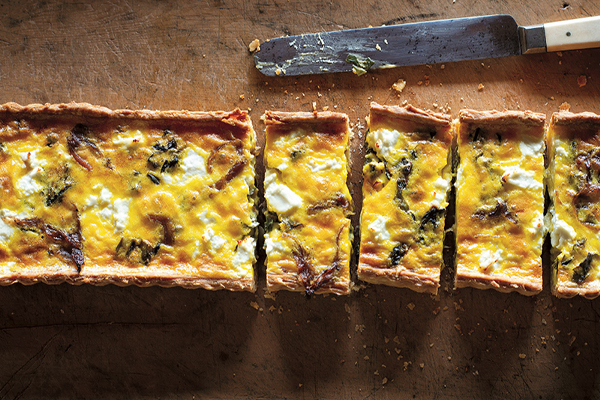Trippin' with Kids: Tips for different ages
21 Aug 2020 | Peter and Bridget Helliar
The idea of travelling with kids is daunting; after all, childcare hard enough just juggling life on a day-to-day basis. However, going on an epic adventure with your kids can also be a rewarding and bonding experience. Peter and Bridget wrote Trippin’ With Kids with the hope that it will inspire, provide the practical tools for anyone to start travelling with their kids, and prove to you, that if they could do it then you can too.
Before you start booking your holiday, consider what will be best given the ages of your kids.
Travelling with babies
Like changing the batteries in the smoke alarm or performing a single one-handed push-up, travelling with babies is easier than you think. They do, however, require a lot more stuff, so lugging the extra around can be tiresome. Your main priorities will be security, sleep, nappy changes and food. We found the easiest thing was to use a baby carrier: you can see the sights you want to see and your bub has what it needs – you (and the food and nappies). Also ensure you never go for full-on days when travelling with babies; always have breaks and allow quiet times for the baby to sleep.
Planes are a good option when travelling with babies, especially with the bassinet option (but book the bassinet as soon as you can because they go very quickly). Take-offs and landings are tough enough on big ears so they will be tough on little ones too. Brij would breastfeed our babies on take-off and landing and that helped. Get them sucking one way or another; if they’re not breastfeeding and don’t need a bottle, try getting them to suck your clean hand or if they have a dummy try that. Don’t worry about a crying baby – most people just ignore it or will politely help if they think they can offer something. The crying doesn’t last forever and it won’t ruin anyone’s trip.
Baby naps will be the hardest thing to keep to schedule if you or your bub need a strict routine.
You can, if you think it will help, start changing their nap times a week before you leave to fit in with your destination. We found that a bit difficult so our little ones simply slept when they could or wanted to – we just watched for tired signs.
Travelling with toddlers

Toddlers on planes are a bit more work, but it is possible. Allow some settling in time and walk around the cabin with them. You can also play games. Just
try to get them not to kick and pull on the seat in front of them.
Toddlers will get more out of a visit to Disneyland than the Louvre Museum, but that doesn’t mean you can’t visit some incredible museums – just don’t take as long as you would travelling without kids. A lot of museums and galleries are free or much cheaper for children, so they are still worth visiting even for a short amount of time.
Our other tips for toddlers include:
- Have at least one extra outfit on your travel day and pack lots of wipes and tissues.
- Go to the doctor before leaving. If vaccinating make sure you are up to date and have any remaining vaccinations at least a week before you leave.
- Have plenty of snacks on travel day (limit the
- amount of sugary snacks).
- Request a kid’s meal for the plane.
- Find accommodation that is easy to get to and close to a supermarket and a park if possible. If staying on a high floor, check there is a lift (and ideally avoid accommodation at the top of a huge hill).
- Kid-sized headphones are helpful for long journeys. Plan ahead by downloading kids’ movies, audio books and so on.
- Get the kids excited with maps and books about your destination.
Travelling with primary school kids
This is the best age to travel with kids. It’s easy to take some time away from school and there are plenty of ways to keep them on top of schoolwork while away. They are eager to learnand see new things around this age. The world is still so big and exciting that everything will be entertainment for them. They don’t need a whole suitcase of extra items and they can carry or pull their own luggage. When we took our three kids backpacking in eastern Europe and the two older boys had their own backpacks to look after and managed the task well.
Long distances are easier with kids at primary school: they all fit in the back seat of the car, they can handle long plane journeys and they don’t care about missing things back home.
Our other suggestions for travelling with kids this age are:
- Consider taking them out of school to avoid busy school holiday travel periods.
- Research the kids’ clubs if available.
- Download some age-appropriate learning apps for maths, spelling and English.
- Get them to write a diary or blog.
- Get them to act out something they found fun on a trip with finger puppets.
Travelling with high school teenagers

We love travelling with teenagers because they are helpful and you can have some pretty awesome conversations with them. However, travelling with teenagers can be more difficult:
school is more important, as are friendships, social life and time to themselves. It’s harder to drive long distances with three growing (and taller than you) teenagers in the back seat.
Involving your teenagers in planning the trip will be an important part of its success. By the time kids are teenagers, they usually have a say in many things the family does, so why wouldn’t they have a say in your holiday destination? Are they adventure-seeking teenagerswith abseiling and whitewater rafting in mind? Or are they theme park diehards with thrill rides on their must-do list? Planning and talking together means you’re more likely to include everyone’s ideas on your trip. For things you want to do that your teenagers are not keen on, keep it short: if you’re going to a gallery or museum, go to the parts you’re most interested in and if the kids want to sit on the steps out the front halfway through, let them. Also, have a teenage-friendly activity planned afterwards. Mix and match your activities so it’s one for you, one for them. And then one for all of you!
The older your teenagers are, the more challenging it will be taking them out of school. Will they be doing homework? Make sure you have wifi or data for this to happen and all the right books. Don’t take Year 11 and 12 students away from school days if possible. Even some school holidays can be hard for this age group with study expectations; you know your child so if you think they are going to be anxious about not doing homework for two weeks in January and there is no wifi, maybe put camping off-grid on hold for a year or two.
It’s also the time for serious discussions. Are you ready to let your teenager do some things without you? Talk about boundaries before you book the trip. You also need to make sure your older teenagers know how to be safe when on holiday, so talking about sex, drugs and new friends is important.
Our other tips for travelling with teens are:
- Have a pack of cards in your bag at all times and teach them some new games (long journeys will be more fun playing cards together than having your kid spend the whole time looking at their phone).
- Get them to buy the train tickets and validate passes for the family (with you watching).
- Go to different theatre productions.
- Encourage them to look up the place you’re visiting and find something they want to do.
- Get them to work out the currency exchange if overseas.
How to stay sane while travelling with kids
Ah yes, one of the great challenges of travelling with kids: maintaining your sanity. Travelling with your little ones can definitely take its toll on your patience and energy levels, and we have, more than once, found ourselves with a crying baby and fighting toddlers in a long queue or at a busy train station or cafe. Most people will sympathise with your plight and generally people will want to help you (even if it’s partly self-serving so they don’t have to listen to a child screaming!). Our approach is to always be polite and smile. As hard as it may be in the moment, try to smile through it. We find sometimes apologising for the craziness can inspire people to help you out. People tend to want help nice, friendly people; it’s human nature to not want to go out of your way to help rude people. Try to stay calm, explain what is happening and ask for help.
You can be completely organised, bags packed perfectly and tickets in hand. Yet the stresses of holidays can creep in and make it about as much fun as a beach holiday for a polar bear. Sometimes just getting everyone to the airport has the potential to be the biggest ‘fight day’ of all; there will be so much nervous energy and excitement, so word-up the kids early on how important it is for everyone to pitch in. As the adults, remind yourselves to breathe and be prepared for not everything to go perfectly. This way it will be a lovely surprise when things do go smoothly (which we are sure they will!).
Here are some of our quick tips to keep your kids (or you!) from having a meltdown in the middle of Times Square:
- Little kids need rest. Don’t push them beyond their limits. Be realistic about their coping abilities. Heading back to the hotel for breaks or finding a park to rest for a little while can be the best thing to do.
- When kids are getting a bit over their siblings, split up and go for a walk.
- On the road? Try to cook some home meals because often kids’ menus can be as dull as a flat basketball.
- Make sure you’re carrying plenty of water. Sometimes you might also need electrolytes, particularly if travelling in humid conditions (or particularly if you opened that second bottle of pinot after the kids went to sleep last night).
- Get some alone time and have an adult conversation. These holidays are not just about the kids. They are just as much about you as an individual and as a couple.
- Stay in decent accommodation. It doesn’t have to be six-star but it will be your sanctuary at times. You don’t want to exchange the hustle and bustle of Shanghai for the hustle and bustle of a cramped and dirty hotel room.
- Be open to diversions, mishaps and experiences. Embrace these where possible. Leave expensive things at home, then you don’t have to worry about losing things.
- Let kids vent. As wonderful as the memories of your trip will be, it can be stressful or overwhelming at times.
- Don’t stress about screen-time rules. Every family will have their own ideas of how much screen time they are prepared to tolerate but chances are if you are getting out and about and seeing the world, your kids will be on their screens way less than they would be at home.
- Be patient with tough times. Whatever the frustrating situation you are in, it won’t last forever. So many things have gone ‘wrong’ for us when travelling but now we laugh at those memories the most. Remind yourselves in the moment – even say it out loud so you can all hear – ‘We will all laugh about this one day.’ You’d be surprised how much it can help defuse the tension in the moment. We sometimes go a step further and try to put a timeframe on when exactly we will begin laughing at this horrid moment.
- Rest when tired and consider omitting something from your list of places to visit. Part of travelling as a family is just being together, whether it be out and about or lounging around a hotel swimming pool or even the hotel room. These are good times to get the kids chatting about what they have seen and even what they are missing from back home.
- Let the kids sleep in sometimes ... if they can. Feel free to do the same occasionally ... if you can.



